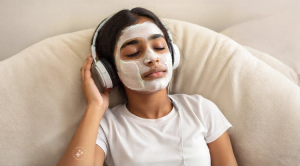Is self-care just for when you’re feeling down?
When you hear the word “self-care,” what comes to mind? Maybe some skincare, binge-watching a favorite show, or just taking a break. But is self-care only for the days when you’re feeling low, or can it be something more? In this edition of Science Lab, let’s break down what self-care really means—and why it’s helpful even when you’re not feeling down.

Self-care: what’s the big deal?
At its core, self-care is about looking after your mental, physical, and emotional well-being. And no, it’s not just about face masks and spa days (though those can be nice too). Self care can also mean things like getting enough sleep, taking a breather when you’re stressed, setting boundaries, or making time for things you enjoy. Think of self-care as the little (and big!) ways you take care of yourself, so you’re not constantly running on empty.
The power of a reset
We all have days that just feel… rough. Maybe school is piling up, your friend isn’t texting back, or your brain just won’t stop overthinking. That’s when self-care can be like a “reset” button. Think of it as giving yourself a chance to pause, recharge, and bounce back a bit stronger.
Imagine you’re like a phone battery, and when it’s low, everything just runs slower and gets more frustrating. Self-care’s like plugging yourself into a charger. Watching a feel-good movie, going for a walk, or doing something nice for yourself helps you get that “battery power” back up, so you don’t totally shut down.
Routine maintenance
Here’s the twist: Self-care isn’t only for when things go sideways. In fact, practicing self-care regularly—even when you’re feeling good—can actually help you stay that way. Think of it as “maintenance mode” for your well-being. By keeping up small, consistent self-care habits, you build resilience, which makes it easier to handle stress or challenges when they come up.
Let’s say you’re in a good headspace right now. You’re doing well in school, spending time with friends, and feeling pretty balanced. This is a great time to add simple self-care practices to your routine, like getting enough sleep, eating well, or setting aside “me time.” These small habits keep you grounded, so you don’t get overwhelmed as easily when things do get tough.
Your self-care combo
So, why not use self-care both ways?
- Daily Self-Care: This is the preventive stuff. Even small actions like listening to music, going for a walk, or just unplugging from social media for a bit can add up. These small practices help you stay balanced, giving you a “well-being cushion” for when life throws you a curveball.
- SOS Self-Care: When you’re really feeling low, go for the self-care that gives you a big boost. Maybe you talk it out with a friend, take a long break from schoolwork, or dive into an activity that distracts you in a good way (hello, binge-watching ganji chudail videos). This is the kind of self-care you lean on when you need to get out of a funk.
Your own self-care routine
When it comes to creating your own self care routine, it doesn’t have to be complicated. Start small! And if you’re not sure where to begin, here are a few ideas you can add to your routine:
– Daily Movement: Incorporate some form of daily movement—whether it’s a quick dance session, a short walk, or a workout. Pair it with 8–12 stretches before bed and after waking up to help you relax and feel energized.
– Daily check-in: Ask yourself how you’re feeling today. Have you eaten? Have you slept enough? Simply paying attention to this stuff can help you figure out what you need.
– Set boundaries: Feeling overwhelmed? It’s totally fine to say no—whether it’s skipping out on a hangout or logging off social media for a bit. Protect your me time!
– Make time for fun: Yes, self-care includes enjoying yourself! Make time for things you genuinely enjoy, whether it’s reading, painting, or just hanging out with friends.
Remember, self-care isn’t just an emergency tool for rough days. It’s something you can use every day to stay balanced, build resilience, and feel your best. It’s your personal recharge station. So, next time you think about self-care, remember: it’s for the good days, the hard days, and every day in between.
To learn more about the topic, do check out this cool video :


